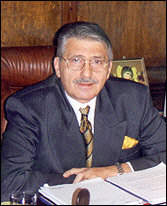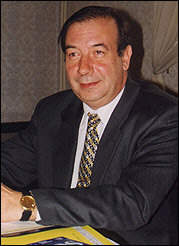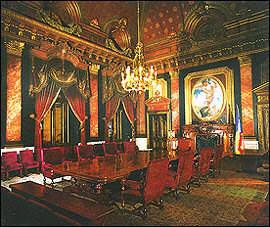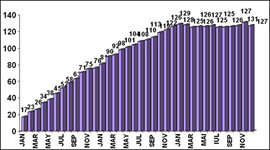 FINANCE FINANCE |

The Romanian Development Bank was purchased by Société Générale in December 1998. Today it stands as one of the most successful privatization stories in Romania. Before 1989 all banks belonged to the State. However the Romanian Development Bank was a case apart. It used to be the Government's investment bank, channeling 90% of all investments before that date, especially from the World Bank. Thus, when Société Générale decided to buy the bank, it knew very well what it was doing. Mr. Bogdam Baltazar, Executive Chairman, is extremely happy with the deal: "Société Générale recognized the value of the bank, not only in the money they paid, but they also increased the share capital of the bank". Mr. Baltazar believes that curiously the only way by which local banks can remain national is through their purchase by international banks. "It is a paradox, but a national bank is one that is anchored in the real economy. The best solution is to bring banks like Société Générale here and they will work in the economy. But they will not finance losers" sentences the chairman of Romanian Development Bank.
When the French entered the management of the National Development Bank the first thing they did was to open the bank more to their clients, especially going after retail customers, thus reducing the financing of morose State-owned institutions. "Payment recovery with them is always difficult. They may pay or choose not to pay. For me as a banker this is an anathema" complains Mr. Baltazar. Not only that, new products have been developed and a stronger marketing force has been set up. But mostly Société Générale has helped to change the mentality of the personnel, making them adapt to the specific needs of the client.
Basically all major Romanian banks have been purchased in some degree by foreign financial institutions. Banca Post, the only one managed by a woman, has been bought by GE Capital, BTR is totally under the Turkish financial group Bayindir, the Greek Alpha Group has acquired Banca Bucuresti's majority shares, and Banca Agricola is struggling to survive, hopefully to be purchased by another foreign group.

According to Mr.
Radu Gratian Ghetea, First Vice President of
the Romanian Bankers Association, "the banking
activity in Romania is one or two steps ahead of
other activities. We have developed much more than
other fields, but we have also had problems" that
other sectors of the economy have not yet endured.
Actually, the financial sector, being in the forefront
of the economy, has already undergone its first
bankruptcies. Right after 1989 "private banks were
created, foreign banks appeared in the market. Everything
was new in the banking activities in the early 90's"
explains Mr. Ghetea. Consequently some large financial
institutions paid the price of all these novelties
and crashed under the weight of bad debts and financial
scandals. Romanian Bankers Association has been
on the lookout for this not to repeat itself. |
Having been created in 1991, the Association works as a lobby group defending the interest of the banking sector and helping to prevent disasters like the collapse of Credit Bank or BankCoop. Its 40 members act as one body before the government, managing to bring to attention problems such as the Y2K bug or the complicated implementation of the International Accounting Standards in Romania. One of their biggest achievements is that most banks are now able to express their capital either in dollars or lei, thus stopping the de facto disadvantage State and private banks were exposed to. In fact, in a transition economy, one of the largest problems for the banking system is de-capitalization. Due to the devaluation of the Leu and the dramatic revaluation of the US dollar in the past few years, this was a major menace, since foreign investors systematically wanted to repatriate their money. The new law that the Bankers Association helped to pass eliminated this problem.

The financial sector has not stopped growing since the fall of communism, in fact there are quite a number of success stories. One of them is that of Gelsor. The largest Romanian private financial fund needed 7 years to attain the position they presently hold. Doubtlessly its success has been contrived by its main proprietor, Mr. Sorin Vantu, a very low profile man who owning 99% of the capital of the firm - the remaining 1% belongs to his wife. Today Gelsor is also involved in media (TV, radio, local and national newspapers) and is soon planning on entering telecommunications, directly competing with Romtelecom, the national telephone company. This smart move will allow them to penetrate the electronic banking market.
Chart 5.4
NUMBER OF LISTED COMPANIES IN THE BUCHAREST STOCK EXCHANGE
1997-1999

However, the Bucharest Stock Exchange is probably the best example of the marriage between finance and technology in Romania. The stock exchange created in 1995 does not have a floor, their trading system being fully computerized. All transactions are carried out via remote trading. The number of companies listed has grown from only 9 in 1995 to 127 in 1999, and the trading value presently stands at US$ 125 million. Mr. Stere Farmache, General Manager of the Bucharest Stock Exchange believes that the privatization process can only help them, since many of the shares of the companies that are presently being privatized will be sold through the Stock Exchange. "Investors are looking for big and attractive companies that bring liquidity to the market" remarks Mr. Farmache. In 1997 foreign participation in the Exchange was up to 80%. That figure dropped to 30-40% due to the poor performance in the economy in 1999. However since the economic indicators have started to improve, Mr. Farmache expects a fast growth and to go back soon to past levels of foreign investment. |

